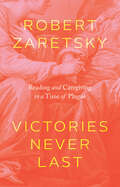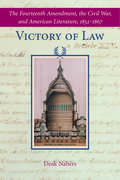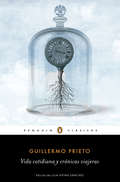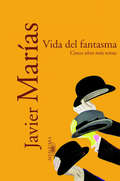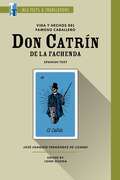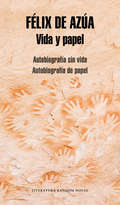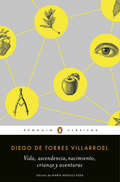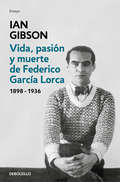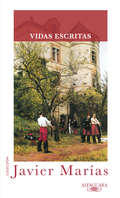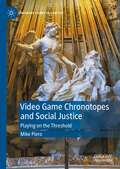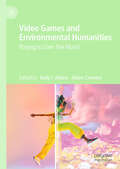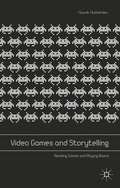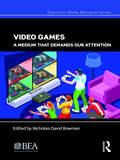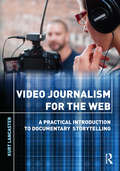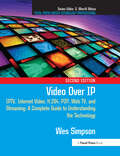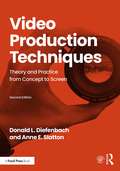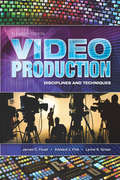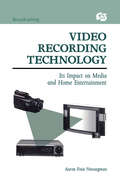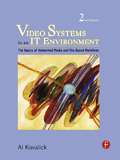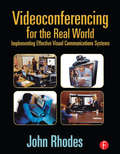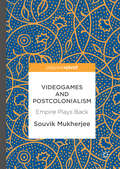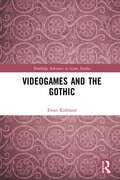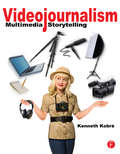- Table View
- List View
Victories Never Last: Reading and Caregiving in a Time of Plague
by Robert ZaretskyA timely and nuanced book that sets the author’s experience as a nursing home volunteer during the pandemic alongside the wisdom of great thinkers who confronted their own plagues. In any time of disruption or grief, many of us seek guidance in the work of great writers who endured similar circumstances. During the first year of the COVID-19 pandemic, historian and biographer Robert Zaretsky did the same while also working as a volunteer in a nursing home in south Texas. In Victories Never Last Zaretsky weaves his reflections on the pandemic siege of his nursing home with the testimony of six writers on their own times of plague: Thucydides, Marcus Aurelius, Michel de Montaigne, Daniel Defoe, Mary Shelley, and Albert Camus, whose novel The Plague provides the title of this book. Zaretsky delves into these writers to uncover lessons that can provide deeper insight into our pandemic era. At the same time, he goes beyond the literature to invoke his own experience of the tragedy that enveloped his Texas nursing home, one which first took the form of chronic loneliness and then, inevitably, the deaths of many residents whom we come to know through Zaretsky’s stories. In doing so, Zaretsky shows the power of great literature to connect directly to one’s own life in a different moment and time. For all of us still struggling to comprehend this pandemic and its toll, Zaretsky serves as a thoughtful and down-to-earth guide to the many ways we can come to know and make peace with human suffering.
Victories Never Last: Reading and Caregiving in a Time of Plague
by Robert ZaretskyA timely and nuanced book that sets the author’s experience as a nursing home volunteer during the pandemic alongside the wisdom of great thinkers who confronted their own plagues. In any time of disruption or grief, many of us seek guidance in the work of great writers who endured similar circumstances. During the first year of the COVID-19 pandemic, historian and biographer Robert Zaretsky did the same while also working as a volunteer in a nursing home in south Texas. In Victories Never Last Zaretsky weaves his reflections on the pandemic siege of his nursing home with the testimony of six writers on their own times of plague: Thucydides, Marcus Aurelius, Michel de Montaigne, Daniel Defoe, Mary Shelley, and Albert Camus, whose novel The Plague provides the title of this book. Zaretsky delves into these writers to uncover lessons that can provide deeper insight into our pandemic era. At the same time, he goes beyond the literature to invoke his own experience of the tragedy that enveloped his Texas nursing home, one which first took the form of chronic loneliness and then, inevitably, the deaths of many residents whom we come to know through Zaretsky’s stories. In doing so, Zaretsky shows the power of great literature to connect directly to one’s own life in a different moment and time. For all of us still struggling to comprehend this pandemic and its toll, Zaretsky serves as a thoughtful and down-to-earth guide to the many ways we can come to know and make peace with human suffering.
Victory Drill Book
by August Enderlin III CThe Victory Drill Book provides reinforcement and drill exercises for students in grades K-8. The book focuses on word lists, but also provides a short list of phonics and spelling rules.
Victory of Law: The Fourteenth Amendment, the Civil War, and American Literature, 1852–1867
by Deak NabersIn Victory of Law, Deak Nabers examines developing ideas about the nature of law as reflected in literary and political writing before, during, and after the American Civil War. Nabers traces the evolution of antislavery thought from its pre-war opposition to the constitutional order of the young nation to its ultimate elevation of the U.S. Constitution as an expression of the ideal of justice—an ideal embodied in the Fourteenth Amendment. Nabers shows how the intellectual history of the Fourteenth Amendment was rooted in literary sources—including Herman Melville’s Battle-Pieces, Harriet Beecher Stowe’s Uncle Tom’s Cabin, and William Wells Brown’s Clotel—as well as in legal texts such as Somerset v. Stewart, Dred Scott v. Sandford, and Charles Sumner’s "Freedom National" address. Not only were prominent writers like Ralph Waldo Emerson and Frederick Douglass instrumental in remapping the relations between law and freedom, but figures like Sumner and John Bingham helped develop a systematic antislavery reading of the Constitution which established literary texts as sources for legal authority. This interdisciplinary study sheds light on the transformative significance of emerging legalist and constitutionalist forms of antislavery thinking on the literature of the 1850s and 1860s and the growing centrality of aesthetic considerations to antebellum American legal theory and practice—the historical terms in which a distinctively American cultural identity was conceived.
Vida cotidiana y crónicas viajeras
by Guillermo Prieto"Será mentira, yo no lo niego, pero invención no; porque como me lo contaron os lo cuento." Guillermo Prieto fue un ameno y prolífico escritor que exploró diversos géneros: cuadros de costumbres, crónica, poesía, teatro, historia y memorias. El lector encontrará en estas páginas una rica selección de crónicas de viajes que Prieto realizó por distintos puntos de la República Mexicana como Cuernavaca, Querétaro, Veracruz y Zacatecas, sin dejar de lado sus descripciones de Nueva York, cargadas de sentimientos patrióticos, retrato de distintos momentos del siglo XIX. En ellos es posible conocer tradiciones, costumbres, diversiones y gastronomía, que hoy son testimonios históricos nacionales. Esta edición estuvo a cargo de la doctora Lilia Vieyra Sánchez, académica del Instituto de Investigaciones Bibliográficas e historiadora experta en hemerografía del siglo XIX, quienrecientemente dio a conocer los "San Lunes de Fidel" y el "Cuchicheo semanario", 21 cuadros de costumbres y 15 crónicas, publicadas en La Colonia Española, que habían quedado fuera de las obras reunidas en 32 tomos de Guillermo Prieto. Edición de LILIA VIEYRA SÁNCHEZ
Vida del fantasma
by Javier MaríasLos artículos y ensayos de un escritor enamorado de su oficio, que opina y polemiza, que observa, critica o aplaude: una colección indispensable para conocer los entusiasmos, las bromas, las reminiscencias y el pensamiento de uno de los escritores fundamentales de nuestro tiempo. Vida del fantasma, publicado por primera vez en 1995 y ampliado en ediciones sucesivas, reúne los artículos escritos desde 1976 hasta 2000 a los que Pasiones pasadas y Literatura y fantasma no habían dado cabida. En cada uno de los cien ensayos que componen el volumen no encontramos ya al articulista o al escritor que vimos en recopilaciones anteriores, sino la figura de un fantasma que observa desde el otro lado del espejo y desde allí se entusiasma, bromea, recuerda y dispara, «alguien a quien ya no le pasan de verdad las cosas, pero que se sigue preocupando por lo que ocurre allí donde solían pasarle y que -aun no estando del todo- trata de intervenir a favor o en contra de quienes quiere o desprecia». Reseña:«Junto al Marías que cuestiona y polemiza [...] sin despojarse de su punto de elegante insolencia o impertinencia, también aguarda el Marías evocador, nostálgico, admirador.»Winston Manrique, El País
Vida y hechos del famoso caballero don Catrín de la Fachenda: An MLA Text Edition (Texts and Translations #37)
by José Joaquín Fernández de LizardiDon Catrín de la Fachenda is a picaresque novel by the Mexican writer José Joaquín Fernández de Lizardi (1776-1827), best known as the author of El Periquillo Sarniento (The Itching Parrot), often called the first Latin American novel. Don Catrín is three things at once: a rakish pícaro in the tradition of the picaresque; a catrín, a dandy or fop; and a criollo, a person born in the New World and belonging to the same dominant class as their Spanish-born parents but relegated to a secondary status. The novel interrogates then current ideas about the supposed innateness of race and caste and plays with other aspects of the self considered more extrinsic, such as appearance and social disguise. While not directly mentioning the Mexican wars of independence, Don Catrín offers a vivid representation of the political and social frictions that burst into violence around 1810 and gave birth to the independent countries of Latin America.
Vida y papel: Autobiografía sin vida | Autobiografía de papel
by Félix de AzúaEvocando décadas de una admirable trayectoria como narrador y ensayista, este ómnibus supone el autorretrato definitivo de Félix de Azúa. El volumen une su Autobiografía sin vida y su Autobiografía de papel, dos testimonios únicos de la marea de imágenes y palabras que le han acompañado a lo largo de toda una vida dedicada a la literatura. En una hipnótica narración a dos voces, el autor recorre en la primera parte la corriente visual que ha configurado su mirada y resigue a modo de contrapunto el paisaje verbal que la acompaña. Literatura, lenguaje, poesía y novela del siglo XX fluyen en esta obra capital a medio camino entre la meditación, el relato y la elegía; un retrato en el que muchos se reconocerán, hijos de una era que anocheció hace tiempo. Pretende precisamente la segunda parte estimular al lector para enfrentar las transformaciones más urgentes de nuestro tiempo. Azúa revisita sus edades literarias para construir una genealogía del tiempo que permite interrogar al mundo a través de la novela, el ensayo, la poesía y el periodismo. Es ésta una peculiar autobiografía donde no importa tanto el sujeto como su experiencia estética, una obra indispensable de uno de los grandes escritores españoles de nuestro tiempo. La crítica ha dicho...«Hay muchas formas de contar una vida. Hay autobiografías sinceras, maliciosas o imaginarias [...]. Félix deAzúa ha concebido otra fórmula: la autobiografía impersonal, que ignora los hechos y atribuye todo el protagonismo a las ideas.»Rafael Narbona, El Cultural «En uno y otro libro, lo que importó no fue la vida en bruto, sino lo que le proporcionaba sentido y orden: el conocimiento. [...] En ambos, el resultado fue una brillante síntesis de antropología cultural.»José-Carlos Mainer, El País «Más que elaborar un relato de sus peripecias vitales, consigue Azúa que una historia del arte yuna historia de la literatura sean su propia historia, porque uno, viene a decir el filósofo, es producto de las imágenes y de las palabras por las que ha transitado.»Fernando Palmero, El Mundo «El relato de un superviviente. En concreto de un superviviente de la muerte cataclísmica del arte. [...] En esta autobiografía sí hay vida, pero la mala y buena vida que dan las letras, el sinvivir del fronterizo hombre literario que crece y piensa y emigra.»Pablo Mediavilla Cost, Jot Down «Una extensa conversación bajo una luz crepuscular, una especie de oportunidad aprovechada por su autor para echar la vista atrás sin ninguna nostalgia. [...] El discurso deAzúa está vivo: es vibrante, intelectualmente desafiante, divertido.»Patricio Pron, El Boomeran(g)
Vida, ascendencia, nacimiento, crianza y aventuras
by Diego de Torres VillaroelLos mejores libros jamás escritos. «Si mi vida ha de valer dinero, más cale que lo tome yo que no otro.» Vida, ascendencia, nacimiento, crianza y aventuras de Diego de Torres Villarroel es la obra inaugural de la novela autobiográfica, un cambio radical para las letras hispánicas del siglo XVIII y, por ello, una obra capital de nuestra literatura. Como si de un relato picaresco se tratase, el autor utiliza los grandes acontecimientos de su vida para hilvanar una extraordinaria narración en la que hace gala de un tono despreocupado, burlesco, provocador y sin duda único. Esta cuidada edición proporcionará al lector las herramientas necesarias para comprender la obra en su contexto y en toda su amplitud. De este modo, la profesora e investigadora María Angulo Egea la ha dotado de una introducción, un aparato de notas y unas actividades sobre la lectura.
Vida, pasión y muerte de Federico García Lorca
by Ian GibsonNueva edición revisada de la célebre biografía de Federico García Lorca escrita por el hispanista Ian Gibson. Esta biografía sobre Lorca, mundialmente aclamada, enriquecida con nueva información, nos ofrece las claves de uno de los genios más apasionantes y más queridos del siglo XX, un revolucionario sin carnet, que cantó al derecho del individuo a su propia vida, a su propio erotismo, a su libertad. Estar al lado de los marginados le condenó a muerte y, por mucho que pasen los años, su obra sigue más vigente que nunca. Reseña:«La novela verdadera y trágica de la vida de Federico García Lorca no puede contarla ya nadie sin tener presente la aventura de indagaciones a la que ha dedicado tantos años Ian Gibson.»Antonio Muñoz Molina
Vidas escritas
by Javier MaríasVeintiséis breves e irreverentes retratos de grandes escritores que se han convertido en la más divertida, melancólica y fascinante invitación a leer. Faulkner a caballo, Conrad en tierra, Isak Dinesen en la vejez, Joyce en sus gestos, Stevenson entre criminales, Conan Doyle ante las mujeres, Wilde tras la cárcel, Turgueniev, Mann, Lampedusa, Rilke, Nabokov, Madame du Deffand, Rimbaud, Henry James, el gran Laurence Sterne... Hasta un total de veinte genios de la literatura resucitan en estas breves e insólitas biografías, que se leen como cuentos gracias a la precisión, amenidad y elegancia de la prosa de Javier Marías. Todos son extranjeros, todos están muertos y todos han sido tratados como personajes de ficción, con un afecto y una ironía no exentos de profundidad. El volumen se completa con seis retratos de «Mujeres fugitivas», que vivieron y murieron por encima de sus posibilidades, con tanta intensidad como humor. Y lo corona «Artistas perfectos», el contrapunto de las anteriores semblanzas: sus imágenes detenidas prescinden de anécdotas y caracteres para subrayar, en frases como relámpagos, la expresividad de los rostros, ademanes y gestos, espontáneos o artificiales, de los artistas que sólo en la posteridad alcanzan la perfección. Los textos van acompañados de extraordinarios retratos, pertenecientes en su mayoría a la colección del autor. Reseñas:«Cuesta contenerse ante el encanto de estos breves retratos... Exquisitos y astutamente irónicos. Un libro encantador.»Michael Dirda, The Washington Post «Al leerlas, se cae de un modo insólito e inesperado en una sensación de éxtasis.»The Washington Times «Una maravilla que exige lecturas y relecturas.»Antón Castro, El Periódico «Marías es un escritor demasiado diestro como para acometer algo como una tediosa teoría de la biografía. [...] Para Marías los grandes escritores no son enigmas por resolver, pero sí paradojas para saborear. De hecho, muchas de estas "vidas escritas" comienzan con una paradoja.»Christopher Benfey, The New York Times Book Review «Una lectura curiosa y gratificante. La voz segura e irónica de Marías junto con su perspicacia hacen que merezca la pena su lectura.»Jamie Berger, San Francisco Chronicle «Vidas escritas prueba lo cautivador, inteligente y original que es Marías como escritor... El éxito del libro se basa en el estilo y el tono, y Marías, cuyo sello es la precisión socarrona, cumple las expectativas con rigor y garbo.»Sarah Emily Miano, The Observer «Tengo la corazonada de que Vidas escritas, de Javier Marías, será considerado un texto de referencia en la historia de la biografía.»Carl Rollyson, The New York Sun «Marías humaniza a estos autores imprescindibles y entra en su leyenda para contar de ellas cotidianidades e iluminar lados dudosos, mas no banalidades. El resultado es una mejor comprensión de aquellas vidas vistas aquí con "afecto y guasa", y no exentas de ironía.»Winston Manrique, Babelia «Vidas escritas es una autobiografía acerca de otros, un viaje alrededor del cuarto de Javier Marías: en las fotos enmarcadas de las paredes, el autor aparece disfrazado unas veces de William Faulkner y otras de Henry James.»Benjamín Prado, Diario 16
Video Game Chronotopes and Social Justice: Playing on the Threshold (Palgrave Games in Context)
by Mike PieroVideo Game Chronotopes and Social Justice examines how the chronotope, which literally means “timespace,” is an effective interpretive lens through which to understand the cultural and ideological significance of video games. Using ‘slow readings’ attuned to deconstruction along the lines of post-structuralist theory, gender studies, queer studies, continental philosophy, and critical theory, Mike Piero exposes the often-overlooked misogyny, heteronormativity, racism, and patriarchal structures present in many Triple-A video games through their arrangement of timespace itself. Beyond understanding time and space as separate mechanics and dimensions, Piero reunites time and space through the analysis of six chronotopes—of the bonfire, the abject, the archipelago, the fart as pharmakon, madness, and coupled love—toward a poetic meaning making that is at the heart of play itself, all in affirmation of life, equity, and justice.
Video Games and Environmental Humanities: Playing to Save The World
by Adam Crowley Kelly I. AlianoThis edited collection investigates topics related to environmental humanities through their inclusion, exploration, or critique in contemporary video games. It focuses on how video games are a site for creating and interacting within environments, with analysis that showcases how environments are shaped within video games as well as serve as a reflection of our real world. This crossroad between the virtual and the real allows us to consider the ways in which the concepts, theories, and issues facing our real-world environment can be understood and studied through video games, particularly via the power of interactive play to teach. This book looks into how video games might empower their players to make real-world change through their immersive environments. Finally, the volume offers a consideration of ecological crises through an exploration of post-apocalyptic narratives in a wide variety of video games. This close textual analysis of video game narratives and play structures allows insight into how and why such stories were crafted and explores the various intersections between these fictional play environments and the conditions of our real world.
Video Games and Storytelling
by Souvik MukherjeeGrand Theft Auto IV saw more copies being sold than the latest superhero blockbusters or the last Harry Potter novel. Most of its players and critics commend its storytelling experience; however, when it comes to academic analysis, mainstream humanities research seems confused about what to do with such a phenomena. The problem is one of classification, in the first instance: 'is it a story, is it a game, or is it a machine?' Consequently, it also becomes a problem of methodology – which traditional discipline, if any, should lay claim to video game studies becoming the moot question. After weathering many controversies with regards to their cultural status, video games are now widely accepted as a new textual form that requires its own media-specific analysis. Despite the rapid rise in research and academic recognition, video game studies has seldom attempted to connect with older media and to locate itself within broader substantive discourses of the earlier and more established disciplines, especially those in the humanities. Video Games and Storytelling aims to readdress this gap and to bring video games to mainstream humanities research and teaching. In the process, it is also a rethinking story versus game debate as well as other key issues in game studies such as time, agency, involvement and textuality in video game-narratives.
Video Games: A Medium That Demands Our Attention (Electronic Media Research Series)
by Nicholas David BowmanThis entry in the BEA Electronic Media Research Series, born out of the April 2017 BEA Research Symposium, takes a look at video games, outlining the characteristics of them as cognitive, emotional, physical, and social demanding technologies, and introduces readers to current research on video games. The diverse array of contributors in this volume offer bleeding-edge perspectives on both current and emerging scholarship. The chapters here contain radical approaches that add to the literature on electronic media studies generally and video game studies specifically. By taking such a forward-looking approach, this volume aims to collect foundational writings for the future of gaming studies.
Video Journalism for the Web: A Practical Introduction to Documentary Storytelling
by Kurt LancasterAs newspapers and broadcast news outlets direct more resources toward online content, print reporters and photojournalists are picking up video cameras and crafting new kinds of stories with their lenses. Creating multimedia video journalism requires more than simply adapting traditional broadcast techniques: it calls for a new way of thinking about how people engage with the news and with emerging media technologies. In this guide, Kurt Lancaster teaches students and professional journalists how to shoot better video and tell better stories on the web, providing a strong understanding of cinematic storytelling and documentary production so their videos will stand out from the crowd. Video Journalism for the Web introduces students to all the basic skills and techniques of good video journalism and documentary storytelling, from shots and camera movements to sound and editing—as well as offering tips for developing compelling, character-driven narratives and using social media to launch a successful career as a "backpack journalist." Shooting, editing, and writing exercises throughout the book allow students to put these techniques into practice, and case studies and interviews with top documentary journalists provide real-world perspectives on a career in video journalism. This book gives aspiring documentary journalists the tools they need to get out in the field and start shooting unforgettable multimedia stories.
Video Over IP: IPTV, Internet Video, H.264, P2P, Web TV, and Streaming: A Complete Guide to Understanding the Technology (Fpmtp/focal Press Media Technology Professional Ser.)
by Wes SimpsonVideo Over IP gives you everything you need to know to choose from among the many ways of transferring your video over a network. The information is presented in an easy to read format, with comparison charts provided to help you understand the benefits and drawbacks of different technologies for a variety of practical applications. This new edition is expanded to fully cover HD and wireless technologies and new case studies.Whether your background is video, networking, broadcast, or telecommunications, you will benefit from the breadth of coverage that this book provides. Real-life application examples give readers successful examples of a variety of Video over IP networks that are up and running today.
Video Production Techniques: Theory and Practice from Concept to Screen
by Donald L Diefenbach Anne E SlattonVideo Production Techniques is an essential guide to the art and craft of video production. It introduces students to the theoretical foundations as well as the practical skills needed to make a successful video project. The opening chapter introduces the reader to the language of motion pictures and sets the stage for effective visual storytelling. Unit I guides students through the theory, techniques, and processes of writing, shooting, and editing video productions. Unit II expands on these basic principles to explore the crafts of sound recording/design, lighting, and directing. Unit III surveys the industries, formats, and methods for creating fiction and nonfiction programs. The final unit of the text examines options for distribution and career opportunities in video production. Newly updated and revised, the second edition of Video Production Techniques unifies theory and practice for instructors and students. It is a great tool for use in introductory-level video production courses and for the independent learner. The accompanying companion website features instructor resources including a sample syllabus, quiz bank, sample assignments, and PowerPoint slides for each chapter, alongside illustrative video demonstrations for students.
Video Production: Disciplines and Techniques
by Edward J Fink James C Foust Lynne S GrossThis popular book introduces readers to the operations underlying video production. It provides thorough coverage of the theory readers need to know, balancing complexity with practical "how-to" information about detailed subjects, and it does so in a concise, conversational style. The authors have incorporated the major changes that have occurred in recent years; further increased the emphasis on digital, non-linear video production; updated and expanded information on mobile technologies; and added more than 25 new or updated figures. The subtitle remains "disciplines and techniques" because the book's focus continues to be on the fact that students need those foundations in order to be successful in video production, no matter where they may end up. Its affordable, student-friendly price, companion website, and print book and ebook options add to this book's practical nature.
Video Recording Technology: Its Impact on Media and Home Entertainment (Routledge Communication Series)
by Aaron Foisi NmungwunVideo recording has recently become an important phenomenon. Although the majority of American homes have at least one video recording set, not much is known about video recording's past and about its continual effect on affiliated industries. This text documents the history of magnetic recording, stressing its importance in consumer as well as commercial applications from the advent of magnetism through the invention of such new technologies as Digital Audio Tape (DAT), High Definition Television (HDTV), and a multitude of sophisicated Digital Video Cassette Recorders.
Video Systems in an IT Environment: The Basics of Professional Networked Media and File-based Workflows
by Al KovalickAudio/Video (AV) systems and Information Technology (IT) have collided. IT is being leveraged to create compelling networked media and file-based workflows. Video Systems in an IT Environment has helped thousands of professionals in broadcast, post and other media disciplines to understand the key aspects the AV/IT "tapeless" convergence. World-renowned educator and speaker Al Kovalick adds his conversational and witty style to this text making the book an enjoyable learning experience. Now in its second edition, this book includes: basics of networked media, storage systems for AV, MXF and other file formats, Web services and SOA, software platforms, 14 methods for high availability design, element management, security, AV technology, transition issues, real-world case studies and much more. Each chapter weaves together IT and AV techniques providing the reader with actionable information on the issues, best practices, processes and principles of seamless AV/IT systems integration.
Videoconferencing for the Real World: Implementing Effective Visual Communications Systems
by John Rhodes"John Rhodes' Videoconferencing for the Real World, is a one of the world's most comprehensive blueprints on the awesome power of videoconferencing."From the Foreword by Brad CaldwellChairman ICIA and President ofIntegrated Media Services, Anaheim, CADesigned to be useful to both technical and non-technical managers, Video-Conferencing for the Real World demystifies the subject of video communications. It provides easy-to-follow guidelines for deploying a cost-effective video-conferencing solution tailored to an organization's specific needs.Developed to flexible to the readers need, Video Conferencing for the Real World offers dynamic problem-solving techniques for the communication challenges facing managers today. Examining the technical, economic, and organizational aspects of each requirement and solution, this book offers a sound base of technical information and provides practical solutions based on a wealth of professional experience. Combining his own ideas with the input of system managers and users, service providers, consultants, and manufacturers, the author has developed a guide that will help readers make more informed investments of their time and money. Special attention is paid to conducting an effective needs analysis, and the development of solutions that will adapt easily to future changes in organizational requirements.Covering a variety of solutions, this book explores the advantages and disadvantages of desktop systems, set-top systems, rollabout systems, and room systems. In addition to compression, multipoint conferencing and data conferencing, this book also addresses topics such as, pilot projects, the preparation of RFPs, service contracts, training, content creation, and convergence.
Videogames and Postcolonialism: Empire Plays Back
by Souvik MukherjeeThis book focuses on the almost entirely neglected treatment of empire and colonialism in videogames. From its inception in the nineties, Game Studies has kept away from these issues despite the early popularity of videogame franchises such as Civilization and Age of Empire. This book examines the complex ways in which some videogames construct conceptions of spatiality, political systems, ethics and society that are often deeply imbued with colonialism. Moving beyond questions pertaining to European and American gaming cultures, this book addresses issues that relate to a global audience – including, especially, the millions who play videogames in the formerly colonised countries, seeking to make a timely intervention by creating a larger awareness of global cultural issues in videogame research. Addressing a major gap in Game Studies research, this book will connect to discourses of post-colonial theory at large and thereby, provide another entry-point for this new medium of digital communication into larger Humanities discourses.
Videogames and the Gothic (Routledge Advances in Game Studies)
by Ewan KirklandThis book explores the many ways Gothic literature and media have informed videogame design. Through a series of detailed case studies, Videogames and the Gothic illustrates the extent to which particular tropes of Gothic culture –neo-medieval aesthetics, secret-filled labyrinthine spaces, the sense of a dark past impacting upon the present – have been appropriated by and transformed within digital games. Moving beyond the study of the generic influences of horror on digital gaming, Ewan Kirkland focuses in on the Gothic, a less visceral mode tending towards the unsettling, the uncertain and the uncanny. He explores the extent to which imagery, storylines and narrative preoccupations taken from Gothic fiction facilitate the affordances and limitations of the videogame medium. A core contention of this book is that videogames have developed as an inherently Gothic form of popular entertainment. Arguing for close proximity between Gothic culture and the videogame medium itself, this book will be a key contribution to both Gothic and digital game scholarship; as such, it will have resonance with scholars and students in both areas, as well as those interested in Gothic novels, media and popular culture, digital games and interactive fiction.
Videojournalism: Multimedia Storytelling
by Kenneth KobreVideojournalism is a new field that has grown out of traditional print photojournalism, slideshows that combine sound and pictures, public radio, documentary filmmaking and the best of television news features. This amalgam of traditions has emerged to serve the Internet's voracious appetite for video stories.Videojournalism is written for the new generation of "backpack" journalists. The solo videojournalist must find a riveting story; gain access to charismatic characters who can tell their own tales; shoot candid clips; expertly interview the players; record clear, clean sound; write a script with pizzazz; and, finally, edit the material into a piece worthy of five minutes of a viewer's attention. Videojournalism addresses all of these challenges, and more - never losing sight of the main point: telling a great story. This book, based on extensive interviews with professionals in the field, is for anyone learning how to master the art and craft of telling real short-form stories with words, sound and pictures for the Web or television. The opening chapters cover the foundations of multimedia storytelling, and the book progresses to the techniques required to shoot professional video, and record high quality sound and market the resulting product. Videojournalism also has its own website - go to just one URL and find all the stories mentioned in the book. You also will find various "how-to" videos on the site. To keep up with the latest changes in the field such as new cameras, new books, new stories or editing software, check the site regularly and "like" www.facebook.com/KobreGuide.
